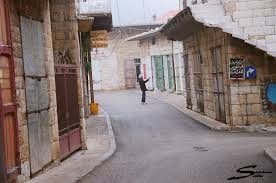"They hid the hashish inside cans of ghee or other food supplies they brought inside the city from Al-Wafideen camp," said Um Omar.
A whole generation of children between the ages of 10 and 16 had to face the absurdity of life that forced them to accept the reality of this war. Many of them have suffered from the bombing, the blockade, imprisonment and death, while others were forced to walk dangerous paths that could destroy their future.
"Whenever Ibrahim walked into his neighborhood carrying presents and toys, his younger brothers ran to welcome him as if he was their actual father, who has been imprisoned for over a year and a half," said Abdullah, a 22-year-old neighbor.
When the protests broke out in 2011, Ibrahim was only 13 years old. The regime forces arrested his father seven months later and blockaded Ghouta, forcing him to do anything he could to provide money for his mother and three little siblings.
Abdullah said, "Ibrahim had to drop out of school and find a job to earn money for his family. He suddenly felt he was responsible for them after his father was arrested by one of the regime's checkpoints around Douma."
"At first, Ibrahim worked at a shop in the market. However, even though he was a good salesman and he earned enough money, he decided to leave his job there after a small dispute with the owner, and started selling his mother's homemade sweets in the street."
Abdullah continued, "No one felt that Ibrahim was just a 13-year-old boy. He was brave and confident, and he took care of his little brothers as if he was their actual father."
Ibrahim eventually found a new job that required him to travel between regime and Free Syrian Army checkpoints. He cautiously moved between them, carrying food supplies from the regime-controlled Al-Wafideen camp into the liberated city of Douma. He sold the smuggled supplies to the blockaded people of Douma, gaining trust in addition to the money his family needed.
"Everyone trusted Ibrahim, even the regime soldiers liked him, but that didn't make him safe, as it was always dangerous to deal with them. The road he took was dangerous, it was surrounded by regime snipers who could shoot anyone on that road," said Um Omar, a former schoolteacher and relative of Ibrahim's mother.
"Ibrahim continued working the job to provide the money his family needed," she said. Raising her voice, Um Omar continued, "He had completely changed ever since he met this man, Alzaybaq (“Mercury”). His mother once told me that she was shocked and suspicious when she found a large sum of money inside her son's closet. And when she confronted him he yelled and left the house without answering her."
Abu Ahmed, also known as Alzaybaq, visited Ibrahim more than once, and the two had a strong business relationship. According to Um Omar, Ibrahim continued to bring products from the camp into Douma, but instead of selling them as he usually did, his new job was to deliver them to Alzaybaq who paid him money in return. “Ibrahim’s mother hated this man and never trusted him," added Um Omar.
"Once, and while Ibrahim was moving some food supplies, he was stopped by a rebel patrol. They searched everything he had and found hashish hidden inside some of the ghee cans he had sealed," said Um Omar, whose heart was full of sadness.
"I admit that Ibrahim had hidden hashish inside the food supplies more than once. Some people bribed the regime checkpoints into keeping the hashish until he would come and transport it to a man called Alzaybaq." She paused for a minute, and continued with a sad smile, "the problem was that this man really lived up to his name. He fooled us all with this nickname and vanished into the thin air and was never found again."
All Ibrahim’s assets were confiscated following his arrest and he is currently detained inside Douma’s "Concrete Prison”. A monthly salary is provided to his mother to assist her in raising her children.
This article does not necessarily reflect the opinion of The Syrian Observer.


